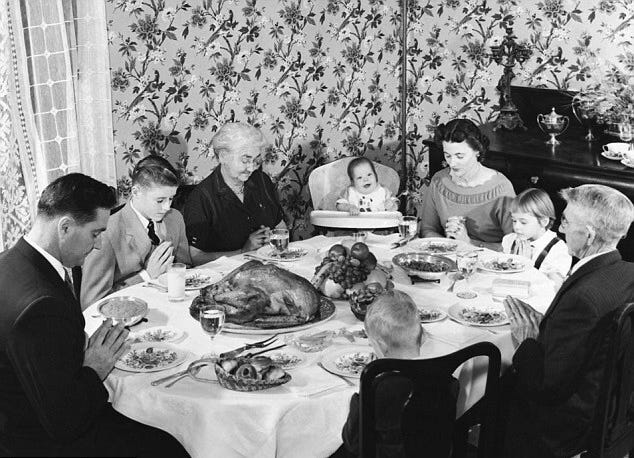THE KOINOS PROJECT is an online educational platform building community through studying community: a place for the intellectually curious, but educatedly stunted searching for something more—for a true mythos. Subscribe now to stay up to date on all our offerings.
What is the meaning of Thanksgiving? As with most holidays today, we usually describe it with general platitudes: an occasion to “be thankful,” or a chance to “get together” with loved ones. It is likely the case that these and other cliches do indeed capture the spirit of the feast—cliches are cliches for a reason. However, this spirit can only be summed up so simply because of the totality of the holiday (i.e. holy-day) that we do not consider.
Americans are not a religious people. This does not mean we are completely faithless or that we are a majority atheist country. It is just that compared historically to other peoples, there is a much more limited number of rituals that bind us together. Indeed, we have such a slight sense of ritual that we often think we have none—even when participating in one! We assume that the “reason for the season” has no real effect upon us when, in fact, the opposite is true. What else would compel family members separated by the vast expanse of this country to travel and participate in such practices? Even when we have ceased to like one another, the ritual itself seems to compel us to continue the ritual. It may even be the very reason a family remains a family—or the nation remains a nation.
As in a religious ceremony, there is a period of preparation that takes place. Year after year, more or less the same meal is prepared. While there are occasional innovations, the most pleasing are always added to the idiosyncratic tradition each family shares (so word to the wise: don’t get too fancy or you will find yourself performing this mighty feat again next year). Like an ancient mystery rite, this stage is often frenzied, and only slowly does order arise from the chaos. Next there is a procession of sorts. Family members, arriving on their pilgrimage, enter one by one to exchange greetings and reconnect. The table is then set with our finest earthenware and we gather round for a communal meal.
We usually begin with an invocation—either a prayer, a call to give thanks, or a general well-wishing is made. For families that keep up the tradition of offering their gratitude, a sort of doxology, a sermon on all the good things of life, takes place. We underestimate the effect these paeans have on us. Uniting the spoken word with the act of feasting ties all things together in a grand metaphysical way as an unconscious reminder of the order and priority of things; while the very act of cooking unites the world of nature with that of society, implicating us in a whole web of relationships and affinities. As food theorist Michael Pollan observes in Cooked: A Natural History of Transformation, “Is there any practice less selfish, any labor less alienated, any time less wasted, than preparing something delicious and nourishing for the people you love?”
“To eat out of the same cauldron,” the Greeks used to say, means to share the same fate. Even when disagreements over which ingredients ought to be added to our cooking pot ruin a particular gathering, the common table reminds us of our common cause. And on a higher level, the common ritual reminds us Americans of our common destiny. Perhaps we will remain a country only as long as we keep the feast and the cult of giving thanks for all that we have been blessed.



This piece cuts through the turkey-scented nostalgia with surgical precision. Your comparison of Thanksgiving to cult dynamics—enforced gratitude, performative tradition, the quiet coercion of 'family obligation'—is both uncomfortable and undeniable. A provocation that makes me wonder: do we celebrate the holiday, or does the holiday celebrate its own mythology? Brilliantly subversive stuff.